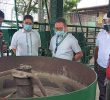BANDAR , BRUNEI DARUSSALAM� Streamlining of rules in customs, immigration, quarantine and security (CIQS) for faster and freer port-to-port movement of trade and services across borders of Brunei Darussalam-Indonesia-Malaysia-the Philippines-East ASEAN Growth Area (BIMP-EAGA) will soon take off in eight priority pilot ports identified by the EAGA CIQS Task Force.
Targeted for pilot streamlining include the ports of Muara in Brunei Darussalam; Labuan, Tebedu and Sandakan in Malaysia; Bitung and Entikong in Indonesia, General Santos and Zamboanga in the Philippines.
At the recently-held 2nd BIMP-EAGA CIQS Task Force Meeting here, representatives of the four member countries have underscored cooperation among CIQS agencies to harmonize rules and processes adopted in these ports that strategically connect four priority sea linkages in EAGA: the Muara-Labuan, Entikong-Tebedu; Bitung-General Santos and Zamboanga-Sandakan routes.
Chaired by the Philippines and attended by officials and representatives of EAGA CIQS agencies, BIMP-Facilitation Center, Asian Development Bank (ADB) and German Technical Cooperation (GTZ), the meeting discussed CIQS-related issues and concerns deemed crucial in improving security and stability of trade, tourism and investment in the growth area.
During the Cebu Summit early this year, EAGA Leaders’ led by President Arroyo issued a marching order for the four countries to simplify and mutually recognize CIQS processes at the designated ports in order to hasten intra-EAGA movement of people and goods within the sub-region.
The Leaders have also directed the CIQS agencies to work on measures that will intensify cooperation to facilitate trade by establishing one-stop CIQS facilities at every designated point.
It likewise endorsed the proposed ADB technical assistance project for strengthening CIQS cooperation in BIMP-EAGA, where a phased approach to harmonization, initially targeting on the selected pilot ports and border crossings will be considered. This is to establish model ports from where best practices could be generated.
The proposed components of the ADB support also include strengthening information exchange and enhancing the role of the CIQS Task Force as a catalyst for harmonization; formulating flexible agreements; pilot-testing agreements; as well as establishing demand-driven trainings and capacity-building programs.
Meanwhile, GTZ, another development partner of EAGA, will be providing institutional strengthening and capacity building support to BIMP-EAGA institutions, and will assist in the implementation of cross-border pilot projects in trade, investment and tourism
.
Undersecretary Virgilio Leyretana, chair of the Mindanao Economic Development Council (MEDCo) which serves as the Philippines coordinating office for EAGA, noted the strengthening of cooperation among CIQS agencies in EAGA.
“It’s important to simplify CIQS procedures and regulations mainly to further ease the movement of people, goods and services in the EAGA and effect economic growth,” Leyretana said.
Created in 1994, BIMP-EAGA is among the fasted growing sub-regional cooperation in East Asia resulting in the establishment of direct air and sea linkages and increased economic activities among the focus areas. (PIA Dispatch)










